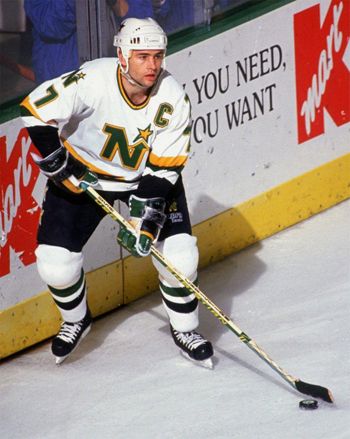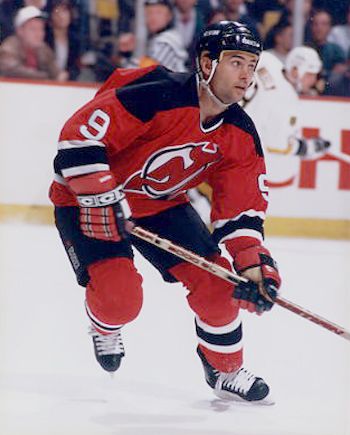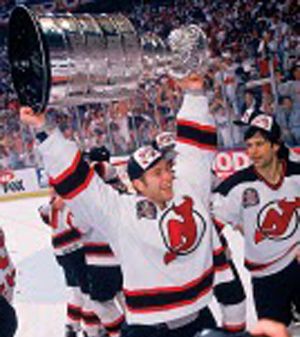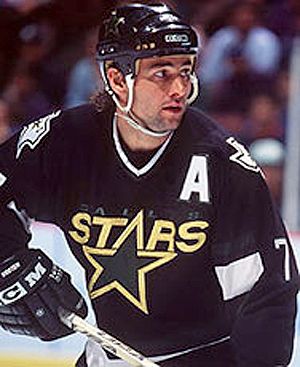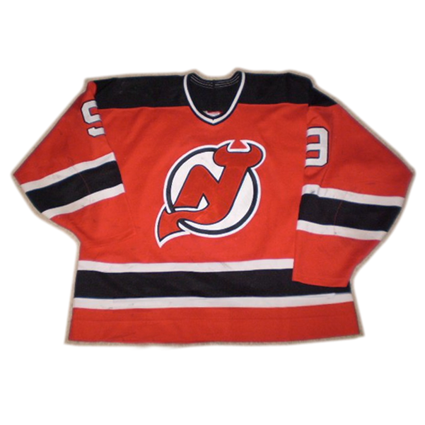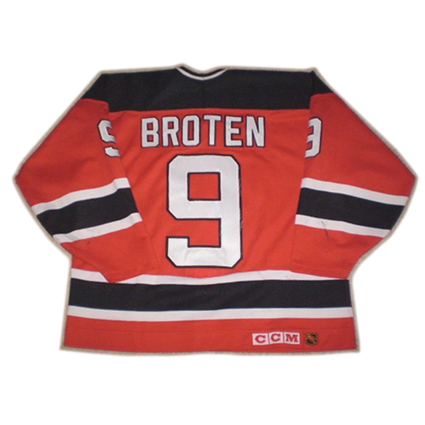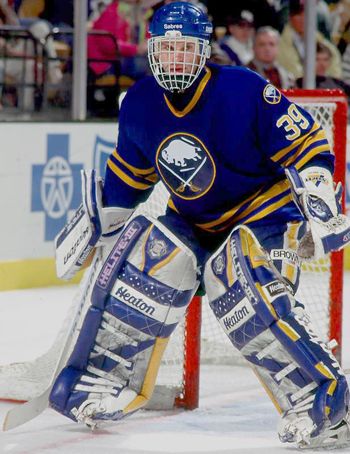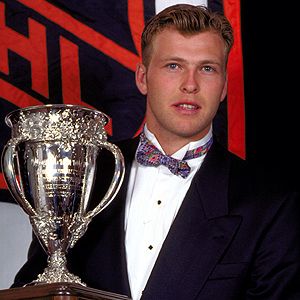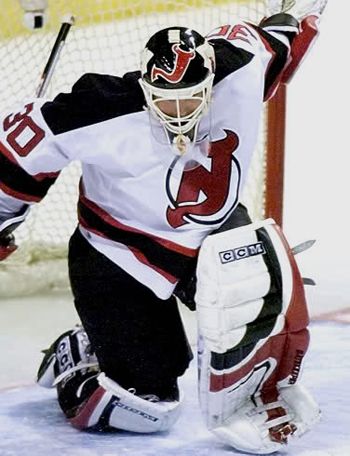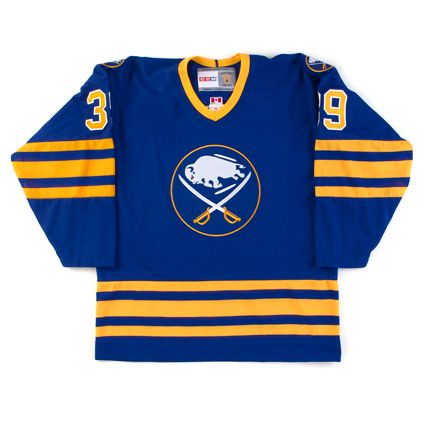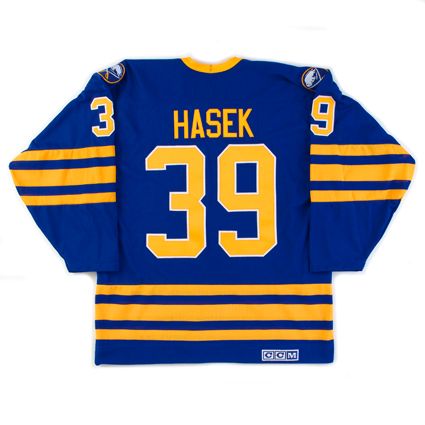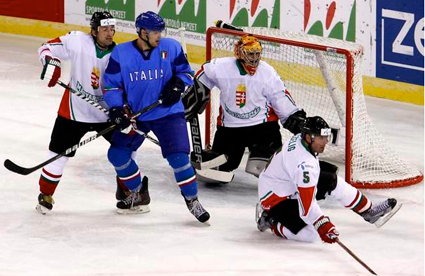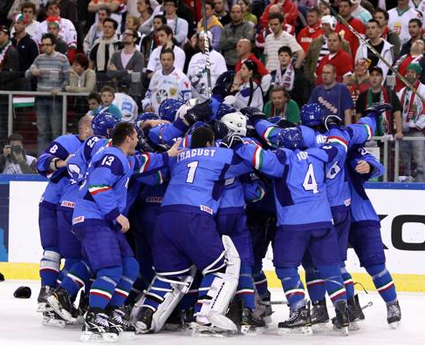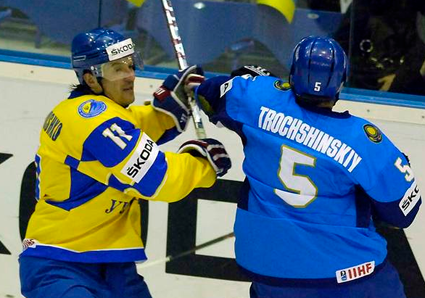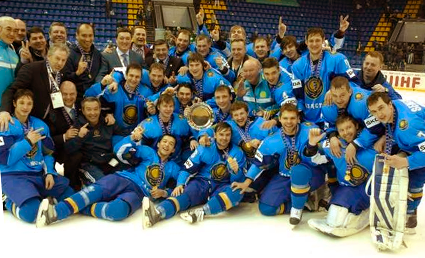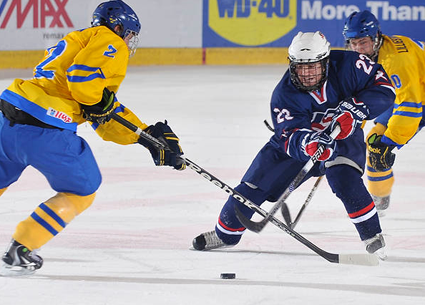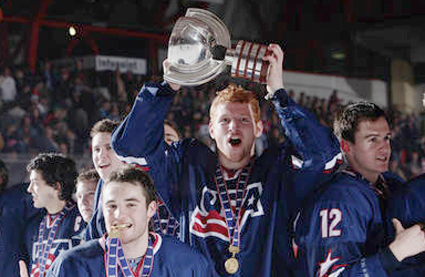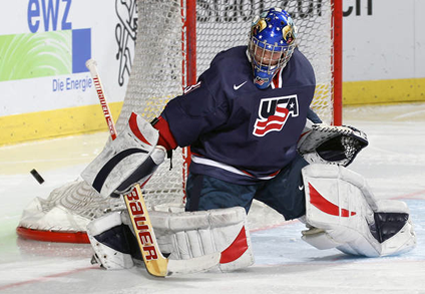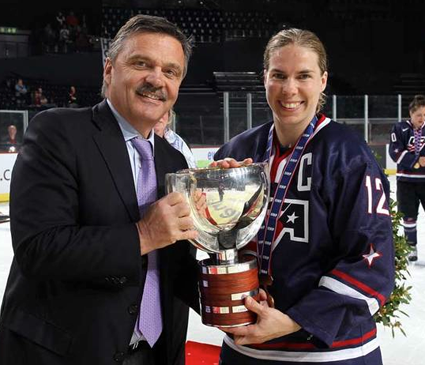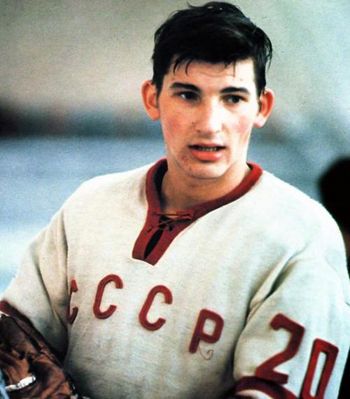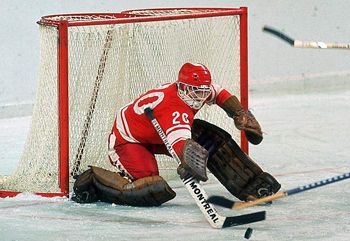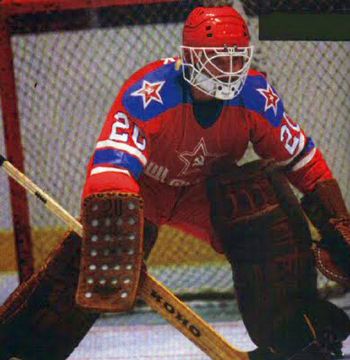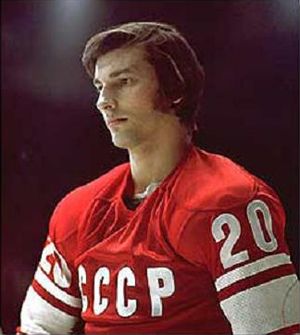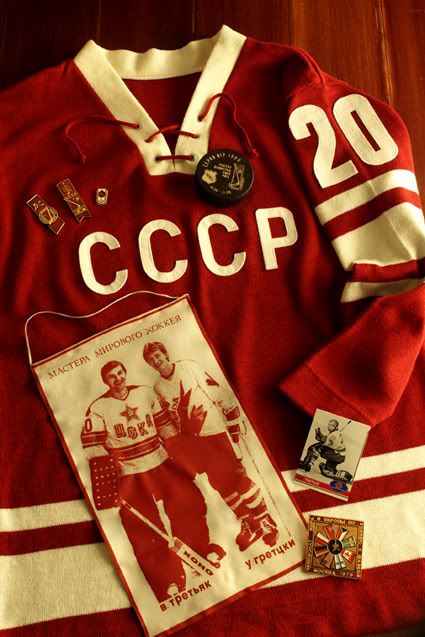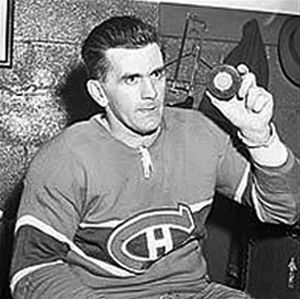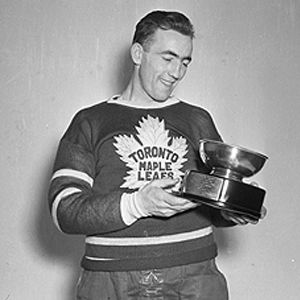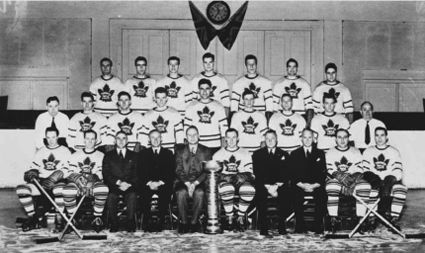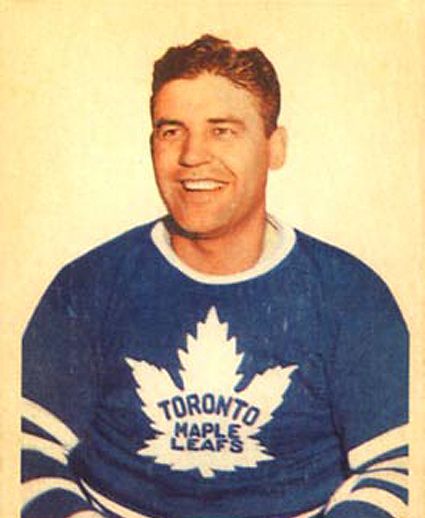Thursday, April 28, 2011
1994-95 New Jersey Devils Neal Broten Jersey
Neal Broten's career got off to a flying start as he, already the winner of an NCAA Championship with the University of Minnesota and an Olympic Gold Medal as part of the famed "Miracle on Ice" United States Olympic hockey team before he even started playing for the Minnesota North Stars of the NHL late in the 1981 season. It was a baptism by fire as he immediately found himself in the Stanley Cup Finals facing the mighty New York Islanders in only his 19th professional game. He signed with the North Stars at the conclusion of the Minnesota Gophers 1980-81 season in time to play just the final three regular season games before being thrown headfirst into the NHL playoffs, where the North Stars made their run to the finals.
In his first full regular season with the North Stars, Broten would score 38 goals and 98 points while finishing as runner up for the Calder Memorial Trophy. The following year he would play in his first NHL All-Star Game and would then go on to lead the North Stars in scoring in three if his first five seasons, including the 1985-86 season, when he would total a career high 105 points to become the first American-born player to reach 100 points in a season and once more play in the NHL All-Star Game.
In 1991, the North Stars would once again go on a run through the playoffs, with Broten scoring 22 points in 23 games as the North Stars would reach the Stanley Cup Finals for the second time in club history.
Broten would eventually move with the franchise to Dallas for the 1993-94 season. During the following season he would be traded to the New Jersey Devils, which would include playing in his 1,000th NHL regular season game, becoming only the fourth U. S. born player, after Gordie Roberts, fellow Minnesotan Mike Ramsey and Joe Mullen, to reach that milestone of longevity.
Broten would conclude his season by scoring the game winning goal in the cup clinching Game 4 to win the Stanley Cup for the first time in his career, giving him the rare trifecta of the capturing the NCAA Championship, an Olympic Gold Medal and the Stanley Cup.
After a brief stint with the Los Angeles Kings in the 1996-97 season, he would return to the Stars to close out his playing days, finishing with 1,099 games played, 289 goals, 634 assists and 923 points.
He would also retire with several team records for the Stars franchise, including the most assists (593), most games played (992), most points (867), most seasons (16), most assists in a single season (76) and most points by a rookie (98) as well as retiring as second all-time in points by an American (923) and with the most games played by an American (1,099).
Aside from the well known 1980 Olympics, Broten would later go on to be a member of Team USA in the 1981 and 1984 Canada Cup tournaments as well as the 1990 World Championships.
His #7 would be retired by the Stars in 1998 and he would be inducted into the United States Hockey Hall of Fame in 2000.
Today's featured jersey is a 1994-95 New Jersey Devils Neal Broten jersey as worn during the season Broten would not only play in his 1,00th NHL game, but score the clinching goal to win the Stanley Cup.
The Devils adopted this style jersey for the 1993-94 season and it has remained essentially unchanged ever since. Additionally, the Devils are one of the few teams to have never adopted an alternate jersey. They have worn their original red, white and green jerseys on a couple of occasions, but as a special occasion throwback, and not as part of their current jersey set.
Today's video section begins with Broten scoring during Game 3 of the Stanley Cup Finals followed by highlights of the deciding Game 6, during which Broten would score the cup clinching goal.
It's just too hard to pass on an opportunity to show Broten's notorious fight with Wayne Gretzky, perhaps the single most unlikely fight in NHL history.
Labels:
Broten Neal,
New Jersey Devils
Wednesday, April 27, 2011
1993-94 Buffalo Sabres Dominik Hasek Jersey
The 1993-94 NHL season concluded with a record number of shutouts, as the various goaltenders combined for 99 regular season shutouts, led by Patrick Roy, Dominik Hasek and Ed Belfour with 7 apiece.
Dominik Hasek
Hasek and the Sabres finished sixth in the Eastern Conference with a 43-32-9 record for 95 points and drew the New Jersey Devils, who finished with the second best record in the conference at 106 points, but were seeded third behind the division winning New York Rangers (112 points) and Pittsburgh Penguins (101).
The Sabres were led by Dale Hawerchuk's 33 goals and 86 points, followed by Russian Alexander Mogilny's 32 goals and 79 points. No other Sabre reached 60 points that season. Hasek played in 58 games during his second season in Buffalo, up from 28 the year before, as he split time with Stanley Cup champion Grant Fuhr in the Sabres net. Hasek's 30 wins were good for 6th place in the NHL that season.
The Devils were led in scoring by defenseman Scott Stevens 78 points from 18 goals and 60 assists. The forwards were led by Stephane Richer's 72 points from 36 goals and 36 assists. John MacLean led the club in goals with 37 on his way to 70 points.
That season's Calder Trophy winner Martin Brodeur led the Devils goaltenders with 47 games played and 27 wins, dividing his time with Chris Terreri, who won 20 of his 44 games played.
Brodeur with the Calder Trophy
The Sabres won the opening game of their playoff series on April 17, 1994 when Hasek blanked the Devils 2-0 in New Jersey. Hasek made 30 saves in the contest to make Todd Simon's power play goal late in the first period stand up until Mogilny sealed the game with an empty net goal with nine seconds remaining.
Two nights later the Devils evened the series by winning 2-1 when Stevens scored at 13:39 of the third period to restore the New Jersey lead after Mogilny had tied the game for Buffalo at the 38 second mark of the third period. Brodeur finished with 23 saves to Hasek's 30 to get the first playoff win of his career.
The series then shifted to Buffalo on April 21st where the Devils repeated their 2-1 victory of Game 2. Richer opened the scoring at 19:01 of the first period and Tommy Albelin scored the vital second Devils goal at 15;43 of the second. Brodeur allowed a power play goal to Mogilny on the power play at 4:08 of the third period to make it a tense final 16 minutes, which included killing off a penalty at 11:54, but the Devils held on behind Brodeur's 29 saves compared to Hasek's 24.
Game 4 on the 23rd saw the two teams combine for as many goals as they had scored in the previous three games combined. The Devils opened the scoring at 9:11 of the first period on the power play, but Buffalo took the lead with two goals within 34 seconds later in the period. The teams traded goals within the first four minutes of the second period to make the score 3-2 for Buffalo, but MacLean tied the game after two periods with a power play goal at 18:36.
Just 30 seconds into the third period Wayne Presley gave the Sabres a lead they would not lose and Rob Ray took some pressure off with his goal for Buffalo at 11:35. The game finished at 5-3 in favor of the Sabres with Hasek making 20 stops to 25 for Brodeur.
Tied at 2 games apiece, the series moved back to New Jersey on April 25th. After Buffalo took a 3-1 lead at the 4:52 mark of the second period, the Devils scored four straight goals over the final 32 minutes to win going away 5-3. Brodeur was credited with 17 saves, while Hasek recorded 30 in the loss.
Martin Brodeur
With the Sabres season now on the brink, they returned home to The Aud on this date in 1994 with no margin for error. The first period passed by scoreless despite three powerplays for Buffalo and two for New Jersey. At the conclusion of the first period, the Sabres held an 11-9 edge in shots on goal.
The second period saw five penalties, two against Buffalo and three for the Devils, including Ken Daneyko's second and third of the game. Despite the number of penalties, neither goalie gave an inch, with Brodeur stopping 10 shots and Hasek 14.
The third period was a close fought battle, with 9 shots for Buffalo to New Jersey's 8. A late penalty on Bobby Carpenter of New Jersey provided the only power play of the period. When Buffalo failed to convert, regulation ended scoreless with a 31-30 edge in shots for the Devils.
The Devils held the edge in play in the first overtime, winning the battle in shots on goal 10-6 with each team getting one power play. Still, the game continued on to a second overtime period as Hasek and Broduer continued to match saves.
A late Buffalo penalty in the first overtime carried over into the second overtime, but still New Jersey could not solve Hasek despite outshooting them 11-8. The remainder of the second overtime passed with no additional penalties as the scoreless game marched on to a third overtime.
Despite no power plays, the Devils took it to the Sabres in the third overtime by putting 14 shots on Hasek to only 5 for the Sabres. Brodeur had to endure one power play for Buffalo, which came at the 12:10 mark. The Sabres man advantage passed without a goal, as did the remainder of the period in this now epic battle.
The first minutes of the fourth overtime saw Hasek turn away 4 Devils shots before center Dave Hannan scored when he pounced on a loose puck and launched a backhander past Brodeur at 5:41 to give Buffalo a 1-0 win after 125:43 of scoreless play to force a Game 7 in New Jersey. It was only the seventh goal Hannan had scored all season, as he had totaled just 6 goals in 83 regular season games.
The final four saves Hasek made in the fourth overtime gave him an even 70 for the game, which set an all-time NHL record for Most Saves by a Goaltender in a Shutout, which still stands today. At the time, it was the 6th longest game in NHL history and still ranks in the top ten.
New Jersey would return home to host Game 7, which they would win 2-1 as Hasek saved 44 of the 46 Devils shots, while the Sabres only managed 18 shots for the entire game, less than the Devils had in the third period alone. Buffalo scored first at 6:00 of the first period on a power play, but it would be their final goal of the series. New Jersey evened the score at 9:53, also on the power play. Claude Lemieux's fourth goal of the series at 13:49 proved to be the difference in this epic battle between two of the finest goaltenders of their generation.
Today's featured jersey is a 1993-94 Buffalo Sabres Dominik Hasek jersey as worn during his record setting 70 save shutout of the New Jersey Devils during Game 6 of their first round playoff matchup on this date in 1994.
The Sabres wore their original style of blue jersey from their inception in 1970-71 through the 1995-96 season until a complete change to their identity package, which resulted in a complete overhaul, with a new logo and color scheme. The black and red look was around for a decade until a return to their blue and gold colors, only with the controversial "Buffaslug" logo.
Their classic look returned for 2006-07 as a third jersey for one season. The white version of their original look was worn for the first NHL Winter Classic in 2007 and a modernized version of the classic look was back in 2008-09 as a third jersey. The unloved slug logo died at the end of 2009-10 and the updated classic third jersey was promoted to the primary home jersey for 2010-11 and has remained in use ever since.
The Sabres wore their original style of blue jersey from their inception in 1970-71 through the 1995-96 season until a complete change to their identity package, which resulted in a complete overhaul, with a new logo and color scheme. The black and red look was around for a decade until a return to their blue and gold colors, only with the controversial "Buffaslug" logo.
Their classic look returned for 2006-07 as a third jersey for one season. The white version of their original look was worn for the first NHL Winter Classic in 2007 and a modernized version of the classic look was back in 2008-09 as a third jersey. The unloved slug logo died at the end of 2009-10 and the updated classic third jersey was promoted to the primary home jersey for 2010-11 and has remained in use ever since.
Today's video selection is a review of the Sabres and Devils playoff series of 1994, with commentary by Don Cherry and annoying music by some evil musician with a synthesizer and way, way too much caffeine.
This second clip features excitable Sabres announcer Rick Jeanneret's call of Hannan's goal to win Game 6, which included his famous reference to vanished union leader Jimmy Hoffa.
Labels:
Buffalo Sabres,
Hasek Dominik
Tuesday, April 26, 2011
IIHF World Championships Report
To follow up on our entry from Saturday, four IIHF World Championships concluded on Sunday and Monday.
Division I Group A saw a winner take all game between Italy and the host Hungarians, who were looking to return to the Top Division after being relegated in 2009, their first appearance in the Top Division in 70 years.
The Italians came out strong, scoring at 3:36 of the first and again at the halfway point for a 2-0 lead which resulted in a change in the Hungarian net with one time Calgary Flames draft pick Levente Szuper replacing Zoltan Hetenyi. Hungary responded less than two minutes later on the power play to pull back a goal. Guilio Scandella scored his second goal of the period on a power play for Italy with just nine seconds remaining to give the Italians a 3-1 lead after one period.
Action from the Italy vs. Hungary final
There was still plenty of time left though, and cheered on by 8,723 partisan fans, Hungary scored the only goal of the second period just seconds shy of the game's midway point. As the third period began with Italy leading 3-2, Italy found themselves a man down 1:19 into the period. The successfully killed off the penalty, but one minute later Hungary evened the score with an equal strength goal at the 4:21 mark. The remainder of the period saw both goaltenders stand strong and regulation would end with the score deadlocked at 3-3.
Hungary began the overtime shorthanded however, as they were assessed a hooking penalty with 45 seconds remaining in the third period. Italy managed two shots on goal, with the second one finding the back of the net behind Szuper off the stick of defenseman Armin Helfer, which had to be confirmed after a review, only increasing the drama, that earned Italy the victory, the gold medal and promotion to the Top Division for 2012.
The Italians disappoint the home fans with their win in overtime
Despite losing earlier in the day in overtime to Spain, the point they gained for the overtime loss gave South Korea the bronze medal. Spain ended up being the relegated squad due to the absence of Japan, who withdrew from the competition due to the earthquake and tsunami which affected the hockey community in northern Japan earlier in the year and were allowed to maintain their place in Division 1 for next year.
Division 1 Group B in Kiev came down to a battle between Kazakhstan and the host Ukrainians, with Kazakhstan only needing to reach overtime to claim the top spot, as they entered the game with a 12-9 advantage in points in the standings.
The first period saw Kazakhstan dominate, finishing the first period with a commanding 12-3 lead in shots on goal, yet the period concluded scoreless. The second period saw a succession of penalties, with Kazakhstan finally opening the scoring on the power play at 11:11. After Ukraine took three successive penalties prior to the opening goal, it was Kazakhstan's turn to parade to the penalty box in the second half of the period, getting called for three penalties within 1:03, which allowed Ukraine to break through with just 20 seconds remaining in the second period to tie the game at 1-1.
Ukraine made the raucous home fans happy with a go-ahead goal at 5:08 of the third period. Still, they faced an uphill battle, as a win in regulation would not be enough, as it would create a three way tie with themselves, the Kazakhs and Great Britain at 12 points apiece. In order to win the tiebreaker and claim the gold medal and subsequent promotion, Ukraine would need to win by four goals or more.
The action was fierce between the two clubs with some of the longest names in the hockey universe
It was not to be for Ukraine, as hard as they tried, they were unable to break through the Kazakh defense despite outshooting Kazakhstan 11-9 for the period. At the 12:22 mark, Kazakhstan got the goal they needed, tying the game at 2-2. They clamped down for the remainder of regulation, happy to see regulation tick away in order to gain the valuable point they needed to claim the championship.
When time did run out with the score tied, the Kazakh's all gathered at the bench to congratulate each other, knowing whatever overtime had in store for them, it was irrelevant to their gold medal status. Riding on the high of knowing they had won promotion, Kazakhstan scored the game winning goal 2:01 into overtime, triggering another celebration.
Kazakhstan celebrates their return to the Top Division in 2012
Earlier in the day, Great Britain won the bronze medal with a 3-2 win over Poland. Lithuania defeated Estonia 5-2 in Saturday's first game between the two winless squads, sending Estonia down to Division 2 for 2012.
After that thrilling day of hockey, the 2011 World Under 18 Championship concluded on Sunday. In the opening game of the day, Russia defeated Canada 6-4 to claim the bronze medal prior to the United States, who defeated Canada 5-4 in overtime to reach the final, squaring off against Sweden.
The first period ended all square at 1-1 thanks to a power play goal for the Americans with just eight seconds remaining to offset Sweden's first goal of the game back at 3:24.
The second period was a good one for the Swedes, as they scored an early goal at 2:21 and then added a second goal three and a half minutes later to take a 3-1 lead after two periods.
The two-time defending champion United States was not going to go away without a fight, and pulled to within one with an even strength goal just 1:20 into the third period, leaving them plenty of time to get an equalizer. During the middle part of the period both teams were whistled for two penalties, but neither team was able to capitalize. As the clock began to wind down in favor of Sweden, Reid Boucher skated into the Sweden zone, beat his defender and rang a shot off the far post and into the net with just 1:29 remaining to send the game into overtime.
Action from the United States game against Sweden
The overtime belonged to the United States, as they outshot Sweden by a large margin, 8-1. Four minutes into the extra period Sweden was called for a holding penalty. Just as the penalty expired, Connor Murphy got off a shot on goal from the left faceoff circle, which was blocked by a diving Swedish defender, only to have the puck bounce off of him right back to Murphy, who got off a second shot, which rang in off the crossbar, giving the United States their third consecutive Under-18 World Championship.
The United States raises their third consecutive Under-18 trophy
Monday saw the championship final of the 2011 World Women's Championship which featured the United States and Canada facing off for the title for the 13th consecutive time. Canada had won the first eight, but the Americans came into the tournament having won the last two and three of the last four.
The two familiar combatants completed the first period tied at 1-1 after trading goals at 16:56 for the USA and 19:52 for Canada, just when it looked like the Americans would take a lead into the second.
Veteran and team captain Jenny Potter put the United States into the lead after two periods with her second goal of the tournament at the 12:05 mark, as the remainder of the period finished scoreless despite the two teams combining for 29 shots on goal.
American goaltender Jessie Vetter on her way to 53 saves
The Canadians were determined to end the Americans current gold medal run by firing 23 shots at US netminder Jessie Vetter. The finally broke through at 16:04 on a power play to tie the game once again, this time at 2-2. Fittingly, the two evenly matched teams failed to decide the gold medal in regulation, making this the fourth championship final of the weekend out of four to require extra time to be decided.
After failing to capitalize on an earlier power play opportunity, the United States won the gold medal at 7:48 of overtime when Hilary Knight won the game when she deposited the puck into a gaping net after getting the puck off a deflection from a shot which came from the opposite side of the goal and finding herself all alone with the puck and plenty of time and space to seal the win for the United States.
IIHF president Rene Fasel presents the championship trophy to Jenny Potter
Vetter finished with 53 saves in goal for the United States, while Shannon Szabados had 50 for the Canadians.
The championship for the American women equalled the three in a row for the American under-18 junior team and concluded a fantastic weekend of dramatic overtime wins in all four tournaments, all of which served as a delicious appetizer for the 2011 World Championships, which begin Friday in Slovakia.
Today's video section begins with the highlights from the women's championship final.
Next are extended highlights of the Italian overtime win over Hungary in Division 1 Group A. For a shorter 4 minute version, click here.
Labels:
IIHF
Monday, April 25, 2011
1972 Soviet Union National Team Vladislav Tretiak Jersey
Widely considered one of the greatest goaltenders in hockey history, Vladislav Tretiak was born on this date in 1952.
An unknown 20 year old, Tretiak was the starting goaltender for the Soviet National Team as the historic 1972 Summit Series began in Montreal. Since the Canadian scouts had only seen him play once, a dismal performance in which he allowed eight goals against due to excessive celebrations at his bachelor party the night before, he was dismissed as no threat to the best professionals Canada had to offer.
Two Canadian goals before the game was seven minutes old only seemed to reinforce the scouts opinion on Tretiak, which would soon change. The Canadians would manage just one more goal for the remainder of the contest as the Soviets came alive and pummeled the startled Canadians 7-3.
His continued outstanding play in the first half of the series earned him a tremendous amount of respect and admiration as the Soviets showed that they were able to compete with the Canadians. Eventually Canada would prevail in the series by the slimmest of margins, but Tretiak's reputation had been cemented by his play in the series.
Although he was drafted by the Montreal Canadiens in 1983 , it was at a time when Soviet players were not allowed to leave for the NHL. Tretiak would spend 15 full seasons playing for Central Sports Club of the Army (CSKA), or as more commonly known, the "Red Army".
During his 15 seasons in the Soviet Hockey League, Tretiak and Red Army would win the championship 13 times and finish runners up the other two. Tretiak was also named the First Team All-Star Goalie 14 consecutive seasons and league MVP five times. Outside of the Soviet Union, Tretiak and the club would take home the European Cup 13 times.
Internationally, Tretiak's resume would show three Olympic gold medals (Japan in 1972, Austria in 1976 and Yugoslavia in 1984), ten World Championship gold medals (1970, 1971, 1973, 1974, 1975, 1978, 1979, 1981, 1982 & 1983) and gold medals in the European Championships nine times. In addition he would be named the winner of the Golden Hockey Stick as the most outstanding player in all of Europe in 1981, 1982 and 1983.
He would also participate in two Canada Cups, earning a bronze with a depleted squad in 1976 and gold in 1981 when he was named the tournament's MVP. His final goals against average in 98 international games was an outstanding 1.78.
Another career highlight for Tretiak is the 1975-76 Red Army tour of North America when the Red Army faced off against various NHL club teams, the first time any Soviet club team had faced off against clubs from the NHL. Red Army came away with dominant victories over the New York Rangers and Boston Bruins and a notorious loss to the Philadelphia Flyers, but the most memorable game was a New Year's Eve contest against the Montreal Canadiens, that season's eventual Stanley Cup Champions, which ended in a 3-3 tie with Montreal outshooting Red Army 38-13 in a game considered by many to be one of the greatest games ever played.
After his early retirement in 1984 at the age of 32, ranked as #37 in the Top 100 Stories of the Century by the International Ice Hockey Federation, due to his desire to wanting to face a new challenge of playing in North America and the Soviet authorities refusal to grant him permission and the strain of the eleven month a year commitment required by the Soviet hockey system plus friction with his coach Viktor Tikhonov, Tretiak would finally make his way to North America in 1990, having been hired by the Chicago Blackhawks as their goaltending coach.
He would become the first Soviet-trained player to be inducted into the Hockey Hall of Fame in 1989 and the first European player voted in without ever having played in the NHL. His induction would be ranked by the IIHF as #55 on Top 100 Stories of the Century. In 2000 he would be voted the Best Russian Hockey Player of the 20th Century as well as being named the goaltender for the IIHF Centennial All-Star Team, a tremendous honor of he highest caliber, as only one player at each of the six positions would be named to this most exclusive team. Tretiak would be elected as the head of the Russian Ice Hockey Federation in 2006.
The many highlights of Tretiak's career appear over and over again of the IIHF list of the Top 100 Stories of the 20th Century. The Soviets victory over Canada in the 1981 Canada Cup ranks as #9, the New Year's Eve game with Montreal #23, the shock opening game of the 1972 Summit Series as #3 and the Soviets victory over the NHL All-Stars in the 1979 Challenge Cup as #36. Even the defeats of the Soviets during the Tretiak era were so uncommon that they merit recognition on the list as well. A loss to Poland in 1976 was #39, the conclusion of the 1972 Summit Series was #2, the loss to the USA in the 1980 Olympics was #1, their loss to the Czechs in 1972 was #5 and in 1974 was #67.
Today's featured jersey is a 1972 Soviet Union Vladislav Tretiak jersey as Tretiak wore in the 1972 Summit Series. It is unusual in that it is a heavy-weight knit sweater with felt letters and numbers.
This photograph was taken by the author and features several additional items from the Third String Goalie memorabilia collection.
Today's first video is his introductory video from Tretiak's Hall of Fame induction.
Here are highlights from the memorable game between the Red Army and the Montreal Canadiens on New Year's Eve in 1975.
Labels:
Soviet Union,
Tretiak
Sunday, April 24, 2011
Hockey Jersey Sunday
Only in Canada would a church have "Hockey Jersey Sunday".
St. Mark's by-the-Lake in Windsor, Ontario hosts "Hockey Jersey Sunday" to celebrate the start of the NHL playoffs, where all members of the congregation wear hockey jerseys to the church services that day.
Here are a pair of videos posted by the church showing the fun everyone had taking part.
St. Mark's by the Lake, we salute you.
Happy Easter!
Labels:
Hockey Jersey Sunday,
humor
Saturday, April 23, 2011
2001 Italy National Team Marco De Toni Jersey
While the 2011 IIHF World Championship in Slovakia doesn't begin until Friday, April 29th, there is plenty of international hockey action taking place this weekend.
First is the conclusion of the 2011 IIHF World Women's Championship in Switzerland. Canada and the United States both went undefeated in the Preliminary Round and received a bye into the Semifinals. Friday's games saw Finland easily defeat their Nordic rivals Sweden 5-1 to advance to face Canada, and Russia came from behind 3-0 in the third period to defeat Switzerland 5-4 in overtime for the right to face the Americans today.
After a day off on Sunday, the losing teams in today's games will meet for the bronze medal in Monday's early game with the winners meeting to determine the champion in Monday's late game. Anything other than the defending champion United States versus Canada would be a surprise considering the two countries dominate the women's game, having divided all 12 previous titles, nine for Canada and three for the US, including the last two.
On the men's side, the 2011 World Championship Division 1 Groups A and B tournaments also come to a conclusion this weekend. Division 1 is held in a single round robin format, with all teams playing each other once, with the champions simply being the teams that finish with the most points atop their group standings, while the club finishing last in each group is relegated to Division 2 for 2012.
Division 1 Group A is being held in Budapest, Hungary and features hosts Hungary along with Spain, Italy, South Korea and the Netherlands.
Heading into the final two games today, Hungary and Italy are tied at 9 points each and are scheduled to play each other today to determine which team will not only with this year's gold medal, but be awarded promotion to the Top Division to play with the big dogs at next year's World Championships in Stockholm and Helsinki.
Korea and the Netherlands both have 3 points. While the Netherlands have completed their schedule of games, Spain, with no points, has one final chance to avoid relegation when they take on Korea in today's first game.
Sadly, Japan was forced to withdraw from this year's competition due to the devastating earthquake and tsunami that mainly affected the northern part of Japan where the hockey community is mainly located. The IIHF revised the schedule to accommodate five teams, rather than the anticipated six. Additionally, Japan will retain their place in Division 1 for next season, with the club finishing last among those competing being the one relegated.
Also wrapping up their tournament is Division 1 Group B, which is taking place in Kiev where hosts Ukraine, Kazakhstan, Poland, Great Britain, Lithuania and Estonia are competing.
Heading into the final day, Kazakhstan leads with a perfect 4-0 record for 12 points. They will face hosts Ukraine, who are tied for second with Great Britain with 9 points. The British are scheduled to face Poland, who enters the final day with a 2-2 record and 6 points.
If Ukraine wins in regulation in front of their home fans and Great Britain wins as anticipated, there will be three way tie at the top of the table with all games completed, bringing the tie breaker of goal differential from games between the three tied teams into effect to determine the champion, with Ukraine needing to win by 3 goals to have a chance. Kazakhstan simply needs to reach overtime, win or lose, to claim the title and return to the Top Division.
Also currently taking place are the 2011 World Under-18 Championships in Germany. This tournament is one of the most important in the eyes of NHL teams, as these are the players they will be drafting this June in the 2011 NHL Amateur Draft. As much as the Under 20 Championships between Christmas and New Year's each year gets all the media attention, nearly every one of those players has already been drafted by NHL clubs, making the U18 tournament a vital one in the eyes of the scouts.
The Preliminary Round was completed on April 19th with the United States winning Group A over Russia and Germany. Sweden won Group B over Canada and Finland while Switzerland, Slovakia, the Czech Republic and Norway were sent to the Relegation Round.
Russia defeated Finland 5-2 in their Quarterfinal to advance to face Sweden today in the first game, while Canada set up a meeting with the United States with their 4-3 win over the Germans.
Following today's games, the losers will meet for the bronze medal on Sunday with the winners advancing to the gold medal game later the same day in front of a large group of scouts from each and every NHL organization looking for the next group of future professionals.
For more information and to follow the action today, please visit IIHF.com.
Today's featured jersey is a 2001 Italy National Team Marco De Toni jersey. Italy plays today for the gold medal in Division 1 Group A and promotion to the Top Division for next year.
This jersey was worn during the 2001 World Championships where Italy finished in 12th place, protecting their spot in the Top Division. They would finish 15th the following season which resulted in relegation to Division 1 after an 11 year stay in the top flight.
Today's video is an advance look at the 2011 IIHF World Championship Division 1 Group A in Budapest, Hungary, and is a remarkably well done and funny video.
Friday, April 22, 2011
1944-45 Toronto Maple Leafs Babe Pratt Jersey
During the 1944-45 NHL regular season, Maurice "Rocket" Richard broke Joe Malone's record for most goals in a season (44) on his way to becoming the first player to score 50 goals in an NHL season, which also established the standard of achieving 50 goals in 50 games, as the NHL schedule was then 50 games long.
Maurice Richard
Richard's teammate Elmer Lach won the scoring title with 26 goals and 54 assists for 80 points, with Richard coming in second with 73. Their linemate Toe Blake's 29 goals and 38 assists gave him 67 points, bettering the Boston Bruins Bill Cowley at 65, making it only the second time in league history that all three members of the same line finished 1-2-3 in scoring.
The Toronto Maple Leafs goaltender Frank McCool won the Calder Trophy as the league's top rookie, the third consecutive season the Calder Trophy winner came from the Maple Leafs following center Gus Bodnar in 1944 and right wing Gaye Stewart in 1943.
McCool with his Calder Trophy
Goaltender Bill Durnan of the Montreal Canadiens won the Vezina Trophy for the second consecutive season as the league's best goaltender, as his stellar 38-8-4 record gave him 14 more wins than McCool and the Detroit Red Wings Harry Lumley's 24 wins.
The final standings were clearly a case of the "haves" and "have nots", as Montreal easily led the league with 80 points, followed by Detroit with 67 and Toronto's 52. Boston qualified for the playoffs despite a poor 16-30-4 record, as their 36 points bested the Chicago Black Hawks 33 and the New York Rangers at 32.
For reasons we will never understand, the four playoff teams were not paired up with first place playing against fourth place and second place taking on third, but with the first overall club from the regular season hosting the third place finisher while the club finishing in second place drew the weakest qualifier from fourth place!
In the First Round of the playoffs, Toronto took the first two games in Montreal, with McCool outdueling Durnan in Game 1 to win 1-0 and following that with a 3-2 win. Montreal won Game 3 in Toronto 4-1 before Toronto put Montreal on the brink of elimination with a 4-3 win in overtime of Game 4 in Toronto.
The series moved back to Montreal for Game 5, where the Canadiens pounded the Maple Leafs 10-3, but the Maple Leafs rebounded back in front of the home fans to end their rivals season 3-2 to win the series in six games 4 games to 2.
In the other series, Boston gave Detroit all they could handle. The Bruins won the first two games in Detroit 4-3 and 4-2 before the Red Wings returned the favor and evened the series by winning twice in Boston by identical 3-2 scores. The series then completely switched form, as the home team won the remaining three games. First Detroit took a 3-2 lead in games with their third consecutive 3-2 victory, this one in overtime. Then Boston forced a deciding Game 7 with a 5-3 win at home, only to have Detroit return the favor with a series clinching 5-3 win of their own back at The Olympia.
The story of the 1945 Stanley Cup Finals was the defense. For the first time, two rookie goalies met in the finals, the 26 year old McCool and Detroit's Lumley, who was just 18 years old. McCool stonewalled the Red Wings in Game 1 at Detroit, which allowed the single Maple Leafs goal to stand, giving them a 1-0 victory.
Toronto managed two goals in Game 2, which turned out to be twice as many as they needed, as McCool again stymied Detroit on their home ice with his second consecutive shutout. Game 3 saw Lumley do just about all he could to keep the Red Wings in the game, but for the third consecutive game, McCool could not be solved and he put the Maple Leafs on the verge of a championship with yet another shutout by a score of 1-0, this time at Maple Leaf Gardens.
In Game 4 in Toronto, Detroit, who had gone 8-1-1 against Toronto during the regular season, finally solved McCool with a goal two minutes into the contest, proving to themselves that he was, in fact, human after all. Despite Teeder Kennedy's hat trick for Toronto, Detroit staved off elimination by a score of 5-3, doubling the total number of goals scored in the first three games combined.
Lumley now got on a roll and blanked Toronto back in Detroit in Game 5 by a 2-0 score before the dramatic Game 6 in Toronto. McCool and Lumley both kept clean sheets for 60 minutes and the contest entered overtime with both teams scoreless. Detroit not only stayed alive, but evened the series and denied the home fans a championship celebration when they won in overtime 1-0, giving Lumley his second consecutive shutout and the fifth one in the series six games.
The decisive Game 7 took place on this date in 1945 in Detroit with the Red Wings now on a roll, having come back from being down 3 games to none and having posted two consecutive shutouts. The game was tied at 1-1 with more than half the third period gone when defenseman Babe Pratt scored at 12:14 to give Toronto a lead McCool would protect to the end, giving the Toronto franchise it's fifth Stanley Cup championship.
The 1944-45 Stanley Cup Champion Toronto Maple Leafs
Toronto also became the first team to ever win Game 7 of the Stanley Cup Finals on the road, something that would not happen again until 1971, and to date has only happened three times following the Pittsburgh Penguins in 2009.
McCool would only play another 22 games in the NHL due to recurring health issues with ulcers, combined with the return of the Maple Leafs incumbent goaltender Turk Broda, who had already been their starting goaltender for seven seasons, from his absence due to his military service during World War II, to backstop the Maple Leafs for another six seasons.
Pratt's goal was the first time in NHL history that a defenseman would score the cup winning goal, which seemed only fitting that a defenseman would win the cup seeing how defense ruled the day with five shutouts in the series seven games.
Today's featured jersey is a 1944-45 Toronto Maple Leafs Babe Pratt jersey. This style of Toronto Maple Leafs jersey was first used in 1938 when the previous crest was replaced with this style. The lettering in the crest was changed to red for the next three seasons, before returning to this exact style with blue lettering in the crest, which would be retained through 1958.
This jersey would be revived as Toronto's choice as their Turn Back the Clock jersey for the NHL's 75th anniversary season in 1991-92. It was so well received that they redesigned their jerseys the following season to reintroduce this jerseys striping pattern and incorporate the crest as a retro style secondary shoulder patch paired with the continued use of their modern leaf as the main crest.
After being dropped in 2007 for a simpler jersey without the waist stripes for the introduction of the Reebok Edge jerseys, this basic pattern would return again this 2010-11 season with the addition of a lace up collar which was used on this jersey from 1958 to 1967.
Furthermore, a white version of this jersey would be first used in 1998-99 to commemorate the closing of their long time home, Maple Leaf Gardens. After a one year absence, the white throwback jersey would return as one of the, if not the finest alternate jerseys in league history.
Pratt would play eight seasons for the New York Rangers prior to joining the Maple Leafs for four seasons and the Boston Bruins for one. When the NHL portion of his career came to and end, Pratt would play five more seasons, mainly with the New Westminster Royals of the PCHL.
During his NHL career, Pratt would win the Stanley Cup twice, first in 1940 with the Rangers and then again with Toronto in 1945. Additionally, he would be named the winner of the Hart Trophy in 1944 as the NHL's most valuable player and inducted into the Hockey Hall of Fame in 1966.
He went on to work as both a TV analyst and goodwill ambassador for the Vancouver Canucks, who named the club's annual trophy for their best defenseman in his honor and wore a memorial patch in his memory on their jerseys after his passing at the arena during a game in 1988.
Oh. My. God.
Babe Pratt jokes with Harold Snepets at a charity softball game in 1982 when shorts were short. Really short. We mean really, really unfortunately short.
Here are the Canucks receiving their 2011 awards, including past winner of the award Snepts, wearing thankfully longer pants this time around but a nearly as hideous retro jersey, presenting the Babe Pratt Award to Christian Ehrhoff.
Labels:
Pratt Babe,
Toronto Maple Leafs
Subscribe to:
Comments (Atom)

